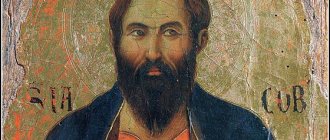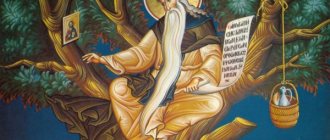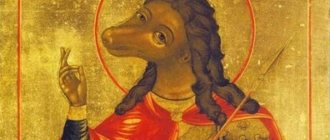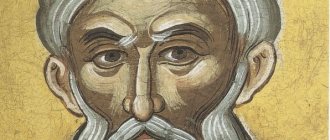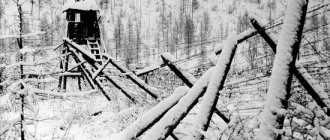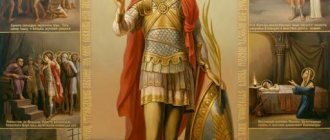Venerable Jacob the Faster: Crime and Repentance
In the 6th century, the hermit monk Jacob lived in Phenicia (an ancient Middle Eastern state on the territory of modern Syria and Lebanon). He was extremely strong in spirit: for example, in the fight against lustful desires, he cut off his own hand. For his determination to fight sin, sincere prayers, deep faith and love for God and his neighbor, Jacob was granted the ability to heal serious illnesses and cast out demons. This gift became a huge test for him, almost destroying the soul of the righteous man.
One day a very young girl was brought to Jacob, possessed by an evil spirit. Jacob prayed for her for a long time, and finally the spirit left her. To consolidate the effect, the girl was left with Jacob for several days, and this was a huge mistake. On the last night, the monk succumbed to passion and raped the girl, and, frightened by his crime, he killed her and drowned the corpse.
Having come to his senses after what he had done, Jacob completely despaired and fled. For a long time he wandered through the desert, hiding from the wrath of God and human justice, and finally came to one monastery, where he was able to repent. Realizing that what he had committed was a grave crime, for which confession was clearly not enough to atone, he went even deeper into the desert, dug a grave for himself and lived in it for another ten years, only at the end of his life receiving a revelation from the Lord that his sin had been forgiven.
Life of our Reverend Father Jacob the Faster
Memory 4 March
In the Phoenician country 1725, near the city of Porphyrion 1726, there lived a hermit named Jacob, who, leaving the bustle of this temporary life and taking on a monastic form, stayed in a cave for fifteen years. Jacob was very successful in his fasting deeds and became so great in virtues and pleasing to God that he was granted power over demons and performed many healings in the name of our Savior Jesus Christ. All people marveled at his virtuous life, and not only believers, but also non-believers flocked to him. Perspicaciously recognizing who was talking to him, the divinely inspired man taught them from the Divine Scriptures and turned them to the true Christian faith. But the primordial enemy of the human race, the devil, who is especially at war with the zealous servants of Christ, seeing that he was put to shame by the many virtues and perfect life of this holy man, rebelled against him with his intrigues, wanting to expel the holy man from those places. For this purpose, he entered into one of the unbelieving Samaritans living in the city of Porphyrion, as he had once entered into Judas, and taught him to work for the expulsion of Jacob. This Samaritan gathered many like-minded people, relatives, friends, acquaintances, neighbors and slaves, and came with them to the house of their wicked priest. There they held a council on how to expel Jacob from the borders of their country, who was converting many from their faith to Christ. After a long meeting, they came up with an insidious remedy. Calling one harlot to them, they gave her twenty gold coins and promised to give her the same amount if she went and persuaded Jacob the hermit to sin. Then they would have accused him and driven him out of their country with dishonor, as a fornicator. The woman they hired went to Jacob and knocked on his door, asking him to open it for her and let her in. When the blessed one did not open to her, she knocked even harder, annoying him with many prayers. Finally, the saint opened the door and, seeing a woman standing, thought that it was a ghost, and therefore, having protected himself with the sign of the cross, he immediately carefully locked the door and, returning to his cell, stood facing the east and fervently prayed to God to take away the demonic temptation from him . Meanwhile, midnight came, and the woman did not stop knocking; Finally, she loudly shouted to the saint:
– Have mercy on me, true servant of the living God! Open the door for me, so that I will not be eaten by beasts in front of your cell.
The Monk Jacob, thinking that it was already midnight and there were many animals around, although reluctantly, opened the door for her and said:
– Where did you come from and what are you looking for here?
The woman answered:
“I am from the monastery and was sent by the abbess to the city on business, but when I was returning, a dark night overtook me, and I got lost and came here. I pray you, man of God, have mercy on me and do not allow me to be torn to pieces by beasts near your doors, but allow me to stay with you this night until the day comes and I go my way.
The Monk Jacob had mercy on her, brought her into his room and, offering her bread and water, he himself shut himself up in the inner cell and left her in the outer one. After eating the bread, she fell asleep a little. Then, pretending to be sick, she began to cry and moan bitterly and, leaning against the door of the inner cell, begged the monk to help her. The saint, looking through the window and seeing that she was sick, was at a loss what to tell her or what to do. The woman prayed to him:
“I beg you, father,” she said, “condescend to my weakness and protect me with the sign of the cross, because my heart hurts greatly.”
The saint, having listened to her prayers, came out to her and immediately, lighting a fire and bringing the holy oil that he had, sat down near her. Holding his left hand on the fire, the saint dipped his right hand in the holy oil and touched the woman’s body, now making the sign of the cross, now anointing and warming her heart with his hand, for she complained of severe pain in her heart. Driven by impure desires, the woman wanted to arouse lust in the saint and incline him to sin, and therefore she said to him:
“I beg you, father, anoint me with oil and warm my heart with your hand, so that my suffering will completely cease.”
Blessed Jacob, being simple in heart and kind, believed the woman’s words and did what she asked. But knowing the demonic seduction that raises war against the flesh, and fearing, as if from excessive mercy and sympathy for the woman, not to lead his soul to eternal destruction, for two or three hours he held his left hand on the fire with firmness enduring the pain, until until my knuckles fell off. So the blessed one fought against the devil’s temptation, so that not a single unclean thought would come to his mind from the unbearable pain. Seeing what the saint did, the woman was horrified. She was touched in her heart and, immediately getting up, fell with tears at the feet of the saint, beating her chest and exclaiming:
- Woe to me, cursed and blinded! Woe is me, that I have become the dwelling place of the devil.
The saint, seeing that she was crying and hearing her words, was greatly surprised and said to her:
- Get up, woman!
Hastily picking her up from the ground and making a fervent prayer to God, he asked:
- Tell me what this means? Why did you come to me?
The woman, barely coming to her senses, told the saint in detail everything how the wicked Samaritans had taught her to seduce the saint, saying that the devil himself arranged this temptation in order to trap a righteous husband in carnal sin, imitating the disembodied in his life. After listening to the woman, the monk sighed and, shedding many tears, gave thanks to God; then, having taught and blessed the woman, he sent her to Bishop Alexander. The woman, coming to the church, confessed all her sins before the bishop. The saint, having sufficiently taught her and seeing that she had truly repented, enlightened her with holy baptism and sent her to a nunnery. So the harlot became the bride of Christ.
Then, having gathered all the Christians and his clergy, the bishop expelled all the Samaritans from the city. After this, coming to blessed Jacob, the bishop, with fatherly instructions, further strengthened him in his blessed life. And the woman, who had previously been a sinner, pleased God with her life and was honored to receive power over demons.
After a little time, the daughter of a noble and rich man, tormented by an unclean spirit, began to call upon Saint James by name. Her parents brought her to the saint and prayed to him that, having mercy on the young girl, he would drive out the unclean spirit from her. The saint, having prayed to God for her and laid his hand on her, immediately, by the power of God, cast out the demon from her, and the girl became healthy. Seeing this miracle, the girl’s parents thanked God and, wanting to bring God’s gratitude to the man, brought him three hundred gold pieces. But the righteous man not only did not want to take the gold, but also did not look at it, saying:
– It is not proper to buy or sell divine gifts, as Holy Scripture says: “Heal the sick, cleanse the lepers, raise the dead, cast out demons; Freely you have received, freely give” (Matthew 10:8). Gold should be given to the poor, because living in the desert, I do not need it.
Having said this, the saint sent back the people sent with the gold. In the same country there was a young man, paralyzed, due to the action of the devil, in both legs; His parents brought this young man to Saint James and asked him to pray to God for him. The monk fasted and prayed for three days and healed the paralytic; then, blessing him, he ordered him to return to his home on his own feet. Many others, obsessed with various ailments, came to this wonderworker and everyone, through his prayers, was healed and returned healthy from him. The saint of God, seeing that everyone revered him, was afraid so as not to fall into vanity, and therefore left the cave and fled, moving away from human glory. Having moved forty miles from the city, he found a large cave in the rock by the river and settled there. Here he lived for thirty years, spending all his days and nights in prayer and tears. For a long time he ate algae growing by the river, and then he built himself a small garden, where he worked part of the day, and ate from the fruits sown and returned. The ascetic life of Saint James so glorified him that for the sake of spiritual benefit, monks and clergy came to him from twenty or thirty monasteries. And not only spiritual, but also many worldly people began to come to him, received instruction in a virtuous life, and, having received his blessings and prayers, returned with much benefit for their souls.
Such a great man, worthy of the grace of God, however, fell into a grave sin. This probably happened because he began to think a lot about his holiness and godly life and consider himself a great ascetic. This was the beginning of his fall. The primordial enemy of the human race, the devil, envious of those who lead their lives pleasing to God and constantly digging a ditch of destruction for them, entered into a young girl, the daughter of a rich man, and began to torment her, calling on her lips the name of Jacob and saying:
“I won’t come out of it unless you take me to Jacob the hermit.”
The parents of the girl, having taken her, walked with her through monasteries and deserts for a long time, looking for the holy father James. Having finally found him, they fell at his feet and began to beg him:
– Have mercy on our daughter, for she suffers greatly from an unclean spirit; It’s been the twentieth day since she takes neither food nor drink, but, emitting cries, she torments herself and calls on your name.
The saint, having stood in prayer, prayed so earnestly to God for her that even the very place where he stood was shaken. At the end of the prayer, Jacob breathed on the girl and said to the unclean spirit:
“In the name of our Lord Jesus Christ, I command you: come out of this young woman.”
And immediately the devil, as if scorched by fire, came out of the girl. She fell to the ground and remained silent for a long time. But Saint James again prayed to God, took her hand and, lifting her from the ground, gave her to her parents. Those, seeing such a miracle, glorified God. But fearing that the unclean spirit might return to her again, they begged the saint to allow their daughter to stay with him for three days until she completely recovered. And the girl remained with the elder, and her parents went home.
When the young woman remained with Saint James, the devil, seeing that the saint was in a deserted, secluded place alone with the young woman, and finding that the most convenient time had come for his intrigues, raised a storm of unclean thoughts and nasty carnal lust on the ascetic and thus inflamed his lust, that the holy man - the same one who could not previously be caught by the seduction of the harlot sent to him by the Samaritans, the one who, in order to preserve chastity and purity, burned his hand on fire, the one who performed many miracles and cast out demons - he was greatly inflamed prodigal lust, that, having forgotten the fear of God and his long-term feats of fasting and the grace and power of healing sent to him from God, being already in venerable old age, he was defeated by the devil and fell. He raped the girl, corrupted her and his virginity, and, desecrating body and soul, destroyed all his previous fasting labors. It was not enough for him to commit one sin, and he added an even more serious one to it. Just as someone who slips from a mountain flies down, falling from stone to stone and breaking, so it happened with Saint James: having committed one great sin, he fell into another greater and more vicious one, aggravating lawlessness with lawlessness. The enemy aroused fear in him, and he began to think: the girl will now tell her parents that I raped her and I will be ashamed and reproached, and I will be in great trouble because of her. Succumbing to the demonic instigation, he killed the innocent girl, thinking to hide his sin from people and avoid shame. But he didn’t stop there either, but gave himself over to sin even more: for the body of the girl, which he had desecrated and killed without mercy with his own hand, he did not give over to the usual burial in the ground, but threw into the river. Such is the fruit of proud conceit, for if this monk had not considered himself holy and great in virtue, he would not have fallen into such cruel sins and the enemy would not have mocked the old age of the one who in his youth once defeated his tricks.
After this, the devil began to bring Jacob, as a bound captive, into the last ditch of destruction, into the most serious of all sins, into the despair of Cain and Judas. The elder, sitting in his cell, did not know what he could do. Strongly convicted by his conscience, sighing and giving in to despair, he no longer dared to open his lips to prayer or turn his mind to God. He decided to flee to some other distant country and, leaving monasticism, settle in the world, and in his old age serve the world and the devil. Coming out of the cave, he quickly set off on his journey, driven and agitated by despair, like a strong sea storm,
But the great, immeasurable and philanthropic goodness of Christ, which cannot overcome the sins of the whole world, which wants all people to be saved and not one of them to perish, did not abandon this lost old man, did not allow the demons to fully rejoice at his death, but according to unspeakable his destinies, arranged for him to rebel from fall and renewal. For when he set off on his journey, he saw a monastery on the road, and entering it he greeted the abbot and his brethren. They offered him to taste the bread, but he did not want to hear about it, and only sighed often and heavily. When the brethren begged him to refresh himself with food, he said to them:
- Woe to me, damned one! how dare I raise my eyes to the sky? How can I dare to call on the name of Christ, Whom I have offended? and how can I touch His gifts, being a fornicator and a murderer?
Then he confessed before everyone in order everything that had happened to him. The abbot and the brethren, having heard his confession, were embarrassed and, sympathizing with him, began to console him so that he would not give in to despair, but, having repented, accepted penance for his sins. For a long time they asked Jacob to stay with them, but he did not listen to them and went into the world. For a long time he wandered through the desert. Finally, by the will of God, a certain divinely inspired man met him and asked the elder to turn away from the path and come to him in his cell. Having convinced Jacob, he brought him to him, washed his feet and offered him whatever food he had, asking him to eat it. But Jacob, convicted and tormented by his conscience, often sighed from the depths of his heart and beat his chest, not even wanting to touch the food. Then the husband fell at Jacob’s feet, consoled him and swore that he would not rise from the ground until the old man agreed to partake of the food offered. When Jacob agreed, the monk rose from the ground, and they both partook of the kind of meal possible in the desert. After eating the food, both stood up, thanked God and sat down again. Then the desert dweller said to Jacob:
“Father, give me instruction for the benefit of my soul, teach me, as your son, about Christ, and strengthen my heart, because I am often and greatly confused by various thoughts.”
Jacob began to sob heavily and, crying inconsolable tears and beating his chest, said:
“Leave me, brother, to cry about my grave sins, with which I have angered God; for I, like a weak youth, seduced by the devil, fell into destruction in this vain and dishonest old age of mine, and now I am completely lost. In my old age I am conquered by the same passions that I conquered in the days of my youth: I fell into unclean fornication and dared to commit more serious sins.
After listening to Jacob, the hermit was filled with intense grief and sadness and began to ask the elder to tell him in detail all the devil’s temptation. He asked to do this for two reasons: firstly, so that the elder, confessing his sins, would be moved to repentance, and secondly, so that he himself, having listened to the story of the elder’s fall, would be taught caution and would not fall into the same temptation. Then Jacob began his story.
“I,” he said, “served the Lord in fasting and in a desert life for more than fifty years, stubbornly resisting passions, the signs of which I even have on my body, for I burned my hand in the fire for the sake of chastity.” And I, unworthy, was honored to receive great grace from the good God, for through me, a sinner, God performed many miracles. Finally, Satan entered into one girl, whose parents, having heard about the grace of Christ that was in me, brought her to me so that I could pray for her. With God's help, I cast out the demon from her. They asked that their daughter stay with me for three days, until she had completely recovered, and, leaving her with me, they left. I, inflamed by carnal lust that darkened my mind, forgetting about God at that time, not fearing Gehenna, not sparing my many years of labor, raped the girl and corrupted her virginity. And it was not enough for me to commit one sin, but, at the instigation of the demon, I dared to commit another more serious than the first, for I killed that girl and threw her body into the river. Despairing of my salvation, I fled from that place and now I am going into the world, for how can I lift my eyes to the heights of heaven? If I dare to call on the name of Christ, heavenly fire will destroy me.
When Jacob, shedding copious tears and sobbing bitterly, finished his confession, the hermit was touched in his heart, and, falling on the elder’s neck, kissed him and said:
“I beg you, father, do not faint mentally, do not despair of your salvation, but with faith that God will heed repentance, confess your sins to Him, for the Lord is abundantly merciful and His mercy towards us is inexpressible.” If God did not accept repentance, then how could David, who had already been granted the gift of prophecy and fallen into the sin of adultery and murder, receive forgiveness for such sins? How could Saint Peter, the supreme Apostle, to whom the Lord entrusted the keys of the heavenly Kingdom, who denied the Lord three times during His free suffering, with bitter tears of repentance not only receive forgiveness of sins, but also be awarded the great honor of being a shepherd of the verbal sheep of Christ? Let us repent while we still have time for this.
Strengthening Jacob's soul with these words, the hermit prayed to him to stay with him. But Jacob did not agree. Then the hermit, falling at the elder’s feet and kissing them, begged him more strongly not to leave him, for he feared that the elder would completely destroy his soul by falling into despair. Not being able to beg Jacob, the hermit greatly grieved and cried. Finally, having made a fervent prayer for him to God, he released him, providing him with the food he needed on the journey, and accompanied him fifteen stages, all the time urging him to repent. Then, hugging Jacob and kissing him with tears, the hermit returned to his cell. Jacob, having walked a considerable distance along the road to the world, turned a little to the side and saw an ancient burial cave, where there were many bones, which had already turned to dust over time. Entering that cave, Jacob collected all the bones, put them in one of the corners and settled in the cave1727. Kneeling down, Jacob, with great weeping and sobbing, beating his chest, began to fervently pray to God, exclaiming:
- How dare I turn to You, my God? what beginning will I make for my salvation? How can I dare to say a prayer with my unclean tongue and defiled lips? What sin will I first begin to ask for forgiveness? fornication or murder? Most Gracious Master, forgive my grave sins; be merciful to me, the unworthy, most merciful Lord, and do not destroy me with my wicked deeds, for my iniquities are great: I fell into fornication, became a murderer, shedding innocent blood, giving my body to water, animals and birds to be devoured; Now, Lord, I confess all my sins to You, the omniscient One, asking for forgiveness. Do not despise me, Master, but according to Your unspeakable love for mankind, have mercy on me, wicked and nasty, show me Your great goodness and cleanse all my iniquities, so that the enemy does not drown me, already immersed in the abyss of sin, and the serpent of the underworld does not devour me.
Blessed Jacob remained in such confession of his sins and repentance for ten years, living all the time in that burial cave. And he became like the living dead, living among the dead and never appearing among the living. If anyone happened to come to that place, Jacob did not enter into conversation with anyone; if anyone asked him about anything, he did not answer a single word, opening his lips only to pray to God and repent of his sins. His food was the herbs that grew in those desert places, and he ate even those very rarely and only a little, just so as not to die of hunger. So Jacob spent ten whole years in incessant tears, sighs and prayers, day and night crying out to God, confessing his sins and beating his chest without mercy.
The all-generous and abundantly merciful Lord, who does not want the sinner to perish and awaits his conversion, did not despise the long repentance of blessed Jacob; Having heard his cries and confession of sins, he forgave him for his sins and again granted him the grace of working miracles.
There was a lack of rain and severe drought in that country. Everyone fasted and prayed, asking God to send rain to the earth. And there was a revelation to the bishop of that city, the virtuous and holy one. In this revelation he was told:
– If the holy elder living in the burial cave prays to God for you, then all your disasters will stop and fruitful rain will fall.
The next day the bishop gathered the clergy and all the people and told him the revelation. With a procession of the cross and prayer singing, everyone set off for that cave. Having come to her, the bishop and all the people began to knock on the closed doors and pray to the saint of God, so that he, having mercy on their country, would pray to God to turn away His righteous anger and reproach from them and stop the drought by sending rain to the earth. But the blessed one did not answer them from the cave, not daring to raise his eyes to heaven; he just beat himself on the chest and said mentally:
- Be merciful, Christ, to my many and serious sins!
The bishop diligently knocked and prayed to Jacob for a long time; but, having received no answer from him, he returned with all those who had come with him, mourning and crying. Upon entering the church, everyone again sang a prayer service, shedding tears. Meanwhile, the storm began to rage even more, and with it severe drought and famine; therefore, people began to pray to God even more fervently, intensifying their fasting and prayers. Then the bishop again had a revelation, during which he clearly heard a voice saying:
“Go to My servant Jacob, whom I told you about before, and if he prays to Me for you, you will immediately be delivered from the disasters that have befallen your country.”
After this revelation, the bishop again with all the clergy and people went to the cave and fervently begged the servant of God, even bothering him, to pray for them; then he forcibly opened the door and took the saint out of there. Blessed Jacob, although he did not want to, raised his eyes to heaven and raised his hands in the air, praying for a long time for these people. And the prayer was still on his lips, when suddenly heavy rain fell on the ground, and the storm stopped. For the Lord fulfilled the prayer of the one who feared Him and heard his request, in fact demonstrating what is written in the prophecy: “Then you will call, and the Lord will hear; You will cry out, and He will say: Here am I!” (Isa.58:9).
The bishop and all the people, surprised and joyful together at this glorious miracle, sang a song of thanksgiving to God in joy and triumph, and greatly honored His holy saint Jacob. And the day on which, through the prayers of Saint James, they were delivered from disasters and received the mercy of the Lord, they established to celebrate in all years.
The Monk Jacob after this received a revelation that God accepted his repentance and forgave his sins. Therefore, by the grace of Christ, he again began to perform many miracles, for all the sick people brought and brought from all that country, possessed by some kind of ailment, immediately received healing, and demons were driven away by the word of the saint. After a little time, Jacob performed even greater miracles than those he had performed before his sin.
In the same year when he asked God for rain, Jacob’s death was announced. Having called the bishop, the saint bequeathed to him that upon his death his body should be buried in the cave where he lived. After this, a few days later, blessed Jacob rested in the Lord and his holy soul was established in the good things of his Lord along with the saints who pleased God with repentance. Jacob lived from his birth seventy-five years. The death of the saint immediately became known throughout the country and a great crowd of people flocked to his burial from everywhere, with candles, censers, incense and aromas; The bishop arrived with all the clergy, and with the singing of appropriate hymns, anointing the holy body of James with many valuable aromas, they buried him with honor in that cave, as Saint James himself bequeathed to the bishop before his death. After a little time, the bishop built a church in the name of this Saint James not far from the cave where he lived, and, taking his honest relics from the cave, transferred them to the church and established the celebration in all years of the holy memory of the honest saint of God, our reverend father Jacob, to the glory Christ God, glorified with the Father and the Holy Spirit forever. Amen.
The Elder-Maiden Dosithea: Overcoming Gender Stereotypes
Once upon a time there lived a girl, Dasha, in the 18th century. When she was two years old, she and her mother and father went to the Ascension Monastery near the walls of the Moscow Kremlin (it was destroyed in 1929) to visit her grandmother-nun, and stayed there. At nine years old, the child was returned to her parents, but she no longer liked life in the world. Until the age of sixteen, Daria, completely in the spirit of teenage maximalism, slept on boards, strictly fasted and refused entertainment, and then ran away, dressed in men's clothes, to the Trinity-Sergius Lavra.
It was not easy to settle into the monastery. The girl pretended to be a young man, but this was not enough: she did not have a convincing biography. She called herself a runaway peasant, and such people were taken into the monastery only with the highest permission. Nevertheless, Dosifei (as Daria was called) was allowed to carry out obedience in the monastery.
The happiness lasted only three years - Daria's desperate parents arrived in Sergiev Posad and recognized the runaway daughter in the young novice. The girl quickly realized that things were heading towards exposure, and fled again - this time to Kyiv. The Kiev Pechersk Lavra did not accept her, and she went to the south of the city, to the town of Kitaevo. There Daria-Dosifei dug a cave for herself and began to live in prayer, eating whatever she could find.
Rumors spread about the strange ascetic and spread far beyond the city. The palace coups had just ended in St. Petersburg, the daughter of Peter I, Empress Elizaveta Petrovna, had come to power, and one day, while in Kyiv, she decided to visit this wonderful monk. Great was the surprise of the ruler when she learned that Dositheus had not yet taken monastic vows! She immediately ordered the mistake to be corrected, and Daria officially became Dosifei - she was tonsured into the ryassophore at the Kiev-Pechersk Lavra.
Dosifei continued to live in seclusion, but thanks to his virtue and prayer he became a famous elder, and many came to him for spiritual advice. Among them, for example, was the merchant son Prokhor Moshnin from Kursk - the future Venerable Seraphim of Sarov. The secret of Dosithea was revealed quite by accident, after her death. And her cell still attracts pilgrims.
Meaning and veneration in Orthodoxy
The Apostle James was buried not far from the place of his death. Later a monument was erected here. The Jewish war that followed the death of the martyr was considered among the city residents as a punishment for the killing of a righteous man. But even after death, people sought to find spiritual help from the apostle, so they came to the temple, built in a cave, where the saint fasted during Christ.
According to legend, the relics of Jacob, the brother of the Lord, were found in 351. Jacob, Simeon and Zechariah appeared to the righteous hermit Epiphanius three times and ordered them to take their bodies from the burial place. The found remains shone with a wondrous light and were transferred to Mount Zion, and after a while a temple was built there in honor of the saints. Centuries later, after many wars and troubles that befell Jerusalem, the relics of the brother of the Lord ended up in Constantinople, in the Chalcopratian temple. In the 20th century, part of the saint’s remains were kept in Russia, in Moscow. These shrines were transferred to the Old Jerusalem Compound in 1853 by Muravyov, who received them as a gift from Patriarch Erofey I of Alexandria.
In Novgorod, the Apostle James was revered as a patron and protector, and here, in the St. Sophia Cathedral, parts of his remains and vestments were also kept. Churches were built in honor of the saint. There were two of them in Novgorod. The apostle was revered not only in the North of Rus', but also in other regions. For example, reliquaries of the remains of a saint were discovered in Smolensk and Moscow. In Rus', the name Jacob was common among the common people.
On the icons the apostle is depicted as a thin old man, exhausted by prayer and fasting, with skin hardened from prostrations to the ground. He is dressed in a hair shirt and a white omophorion and phelonion. The face of the righteous is meek and sad. In the hands of the apostle is the charter.
Orthodox Christians turn to Jacob in prayer in cases where they have doubts about their faith. The great teacher and mentor, the first apostle to perform the sacred sacraments, will help you strengthen your love for God even in moments of despair and sadness. During his lifetime, the saint performed healings for the sick, which is why people still pray to him for the cure of ailments and ailments. Turning to the brother of Christ helps in any troubles in life, thanks to his love for people and meekness of spirit.
The liturgy written by Saint James was not known in Russia until the 20th century. It was first served in 1970 in Leningrad. Now this rite of worship is performed in some dioceses. Traditionally, this is done on memorial days: October 23, as well as on the first Sunday after Christmas, as well as January 4 - the Council of the Seventy Apostles.
Teneva from Glasgow: Sin and Sacrifice
Saint Kentigern (Mungo), Bishop of Glasgow
A very strange story happened at the end of the 6th century in the Scottish city of Glasgow. The young princess Teneva suddenly found herself pregnant, and not from anyone, but from the ruler of the neighboring state (Rheged) Owen ap Urien. There is an opinion that the noble king simply committed violence against a gullible girl. But no one began to figure it out: she sinned, she sinned. Tenev's daddy ordered the child to be thrown off the cliff. The girl miraculously survived, but for obvious reasons did not return home. She reached the city of Culross, where Bishop Saint Cerf sheltered her. He became the named father of her son, Kentigern. He, too, was glorified as a saint, and he is better known under the name Mungo. Remember the hospital for wizards in the Harry Potter series of books? St Mungo's Hospital. The same one. As for Mungo’s blood father, who fled from the girl he seduced and never once took an interest in his own son, he became the prototype of one of the Knights of the Round Table. He was such a noble man.
Venerable Mastridia: “If only my eyes could not see you”
In Egypt there lived one pious girl with the amazing name Mastridia. She was miraculously beautiful, but she was not interested in that: she just prayed and did handicrafts. One day she had an annoying admirer. Literally did not give her a pass. Poor Mastridia could no longer even go to the temple without the annoying attention of the young man. Her patience ran out, and she invited the young man to visit. The young man was delighted, probably took flowers and sweets (or whatever girls were supposed to wear in the early Middle Ages) and went to visit Mastridia. The hostess greeted him cordially, sat him down at the table and suddenly asked: “What do you especially like about me?” The young man was confused and, stuttering with excitement, answered: “Your beautiful eyes.” Mastridia took the weaving shuttle she was working with and gouged out her eyes. The young man, shocked (not surprisingly) by this act, took the path of repentance and indulged in an ascetic life.
Saint Barbara of Lucania: man is the most dangerous animal
In the 9th century, a certain extremely cruel robber was operating in Northern Greece. Even his name has not been preserved: his name was simply “barbarian”, “pagan”. There is an opinion that he was at first a Muslim warrior, but when his army was defeated, he began to live by robbery. However, his religious affiliation is not very important, but the story of his life after repentance is important. By the way, he also repented in an interesting way: he looked at the pile of loot and realized that he couldn’t live like that. Or, according to another version, he decided to kill the priest, came to the temple, but again realized that this was impossible, and repented. In any case, he came to the priest, confessed his sins, renounced his treasures and asked to be allowed to live. The priest agreed, but Barbarian did not follow him, but crawled on all fours, like an animal. And he began to live with the cattle.
After some time, Barbarian, still on all fours, went into the forest, where he lived for twelve years. Exhausted, blackened by the heat and cold, he truly began to resemble an animal. But his soul rejoiced - the Lord revealed to the former robber that he had not only forgiven him, but would also give him martyrdom. This was no ordinary martyrdom.
One day, merchants were walking through the forest where Barbarian lived. Hearing a rustling sound from the bushes, they got scared and shot at random. When they approached to see what kind of game they had killed, they were seized with horror: in front of the merchants was a mortally wounded man. But Varvar did not condemn his random killers at all - on the contrary, he asked them not to worry and to convey information about his death to the priest who sheltered him after repentance. And he died. And his darkened beast-like body was illuminated by heavenly Light. And his relics are revered as miraculous.
Nun Elizaveta (Senchukova)
What is known about the Apostle James, the brother of the Lord, from the Bible
The name Jacob is translated from Hebrew as “suppressor” or “follower.” It was this ancient name that was given to one of the sons of Joseph the Betrothed, the husband of the Virgin Mary, the mother of Christ. James and Jesus were half-brothers. And initially, when the Lord began his ministry in the land of Israel, his brother according to the flesh did not support his teachings.
Jacob was a Nazirite. These people dedicated themselves to God and took sacred vows of celibacy, abstinence from food other than bread, and from drinking wine. They led an ascetic and strict life in order to acquire the spirit of God in their hearts. Because of his adherence to Old Testament teaching, the future apostle could not follow Jesus.
However, when Christ, resurrected after the crucifixion, appeared to his brother and called him to serve, all doubts disappeared, and the righteous man joined the number of 70 apostles with whom the Christian church began. And, moreover, according to John Chrysostom, Christ himself appointed James bishop of Jerusalem.
The period of the saint’s service as a bishop is mentioned in the Bible, the Acts of the Apostles and other sources. In addition, the letter of James is included in the New Testament. The apostle's work was diligent and difficult. Jerusalem, the city that crucified Christ, did not tolerate the new Church. The Jews expelled Christians from the city and killed them. Therefore, serving in such an important spiritual position became a serious test.
But, despite the difficulties and the threat to his life, Jacob courageously fulfilled his duty. Thus, he participated in the first Council of the Apostolic Church. Servants of Christ gathered in his house to listen to the divinely inspired voice and spread the Word of God. St. Paul calls James the pillar of the church. James participated in deciding which of the apostles would go where to preach.
The authorship of James belongs to the Christian liturgy, written to serve the Lord. Later, Saints John Chrysostom and Basil the Great shortened it. This is so that ordinary people can understand and participate in the church service. However, the Syrian Christian Church still serves this ancient liturgy.
The severity and holiness of the Lord's brother were obvious even to his enemies - the Pharisees and Talmudists. Opponents of the true faith recorded that the apostle healed people and delivered Jerusalem from bad weather. His ascetic and strict lifestyle, constant prayers and kneeling, which made the skin on his knees like that of a camel, did not allow Jacob to be accused of atheism or other sins. Therefore, his opponents retreated before holiness.
The people loved Jacob. People revered him as a holy ascetic and sage. If there was no hope left, they came to the apostle's house to find help. Therefore, in the city the servant of Christ was called “obli”, “ofli” - a stronghold. When there were rebellious unrest in Jerusalem, ordinary residents trusted in him.
On the days of the great holidays, Easter, Jacob preached the Word of God to all the people flocking to the city. And the power of his speeches was such that it aroused the hatred of the servants of the Jewish religion. When the apostle was already in his sixty-sixth year of life, the high priest Ananias decided to kill the brother of the Lord.
The Jew assembled a Sanhedrin, accused the highest Christian bishops of breaking the law and demanded renunciation of the Lord. Jacob and those with him rejected the demands of the high priest and were executed. According to Christian sources, Jacob was thrown from the roof of Solomon's Temple and stoned. The historian Josephus names this martyrdom as the reason for the fall of Jerusalem.
